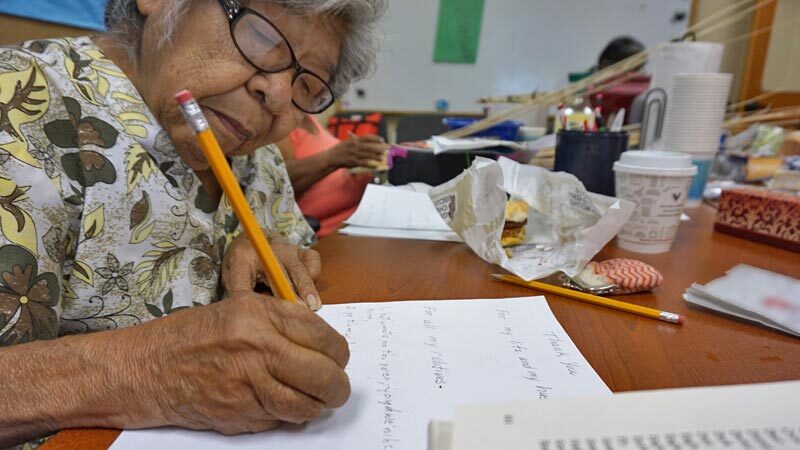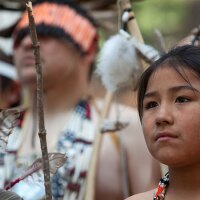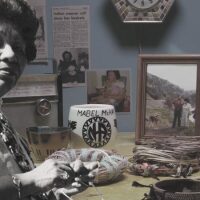Weaving the Words Together: Protecting Language and Life at the Same Time


The first thing Wukchumni elder Marie Wilcox wants people to learn is the true way to pronounce “Yokuts,” the broad and sweeping name that means “the people,” given to all the peoples living throughout California’s great Central Valley and up into the Sierra before colonization. Here’s a recording of Marie teaching the word’s true pronunciation:
The average Californian, even if they happen to even know something about the Yokuts and Yokuts history, wouldn’t necessarily know that there are around 60 different communities of people that fall under the umbrella of “Yokuts.” The Wukchumni are but one of those 60.
Marie Wilcox is the last fluent speaker of the Wukchumni language.
In 2014, as part of the Global Oneness Project, Emmanuel Vaughan-Lee created a 10-minute documentary called Marie’s Dictionary that told how Marie came to be the last fluent Wukchumni speaker, and how over the course of several years she came to compile and write the Wukchumni dictionary. Both the New York Times and National Geographic picked up the short documentary, as did KCET's sister organization LinkTV. From there, word of Marie, her dictionary, and her story spread and brought about a wider awareness of the Wukchumni and the Yokuts in general.
The Wukchumni are the Yokuts belonging to the Kaweah River and the Lemon Cove area in Tulare County. The Kaweah River once flowed from its headwaters in the southern Sierra Nevada down into the great Tulare Lake. That was before the river was dammed and its water diverted to feed the appetites of agriculture and the growing settler communities in the Tulare Basin. Before the destructive Spanish mission system took hold in California the Yokuts population was around 50,000, according to the most recent estimates. Today there are maybe 300 Wukchumni living in the basin; less than 5 percent of the native riparian habitat of the Tulare Basin remains intact.
Spurred by her sisters teaching Wukchumni words to the young people in their community, Marie decided to start writing down the words she remembered.
“I was just fooling around one day, and putting a few words down,” she says. “They were just plain words, one word sentences. I don’t know how many pages I had, maybe 98 I think it was, that I could remember at the time. I had books too, with Wukchumni words and some other words I could recognize from different tribes that were a part of our language too. I worked on that for a couple of years; maybe three.”
In the end it would take seven years for Marie to complete her dictionary.
Growing up, while Marie’s parents worked long hours in the fields, she was raised by her grandmother, Dinky Wilcox, who gave Marie her Indian name Che’ihmyat. Dinky Wilcox only spoke Wukchumni, immersing Marie in her native language from a very young age. “Growing up was real nice because I got to be with my grandma, and we would go out to gather white root and she would bring biscuits and potatoes, we’d have lunch. I thought it was a pretty nice life. Not like it is today. We would go to North Fork Powwows; Grandma would play cards with the other ladies and I’d be under the table listening to them. You know how they talk, about everything. They gossip!
“I think it was a much better world back then. How we stayed one family, we came together a lot. You don’t see hardly anybody do that anymore. We used to plan things together. I think my grandmother is guiding me to stay that way.”
Marie’s grandmother passed away when Marie was still a young girl. From that point on she lived with her sister and her Filipino brother-in-law in Stockton for a while, and survived company men shooting at Filipino union members. When diabetes left her older brother bedridden, she moved back down into the south valley to help care for him. There Marie worked in the fields, married her first husband and had her first child at the age of 16. Her life resembled that of many young women with children and a partner to look after; working for survival and drinking for a good time.
It was not until her mother’s passing in the late 1970’s that Marie began to think about the traditions her grandmother had kept, “And I thought, oh my gosh, I gotta teach our kids our traditions.”
Ecologists often use "indicator species" as gauges to determine the health of an ecosystem. From a social science point of view, languages can be “indicator species” too.
From that point forward Marie became a Wukchumni elder, performing the face-washing ceremonies for the dead, imparting Indian names to the young, and — with the help and support of her daughter Jennifer— remembering and teaching the Wukchumni language, Yokuts’ basket weaving, and bead work. The second time I met Marie, after initially meeting her at a yearly Go Native! event that Jennifer organizes, was at the Kaweah Oaks Preserve. She had been asked there to do a blessing of the preserve. The Kaweah Oaks Preserve is one of the few intact valley oak woodlands left in the Tulare Basin, and was once the territory of the Kaweah River Wukchumni Yokuts.
Ecologists often use "indicator species" as gauges to determine the health of an ecosystem from a scientific point of view. From a social science point of view, language can be considered an “indicator species” through which we can assess the health of not just the culture, but also the landscape in which that language evolved from. When a language is endangered and then lost, what else becomes endangered? What else is lost?
When I asked Marie this question she laughed, “I wouldn’t know. I’ve never been through that.” But when pressed she added, “They’re ah, I don’t how to describe it… they’re lost. If they really think about it, they’re lost. And that isn’t a good feeling to the ones that want to belong. That sorta means they really don’t belong, they’ve lost their identity.”
“If you lose the language you lose the land. You lose the connection. If you lose one you will lose the other” Jennifer added.
Marie continued, “Nowadays people are trying to find somebody that knows their language so they can learn it.”
Attendance for Marie and Jennifer’s weekly Wukchumni language classes is low and irregular. People come with genuine interest and sometimes great need. But as with learning any foreign language, the learning curve is steep. When that language has just one fluent speaker, a student may only be able to practice through conversation once a week for an hour or two.
Marie is fully aware that she may remain the last fluent Wukchumni speaker. But she also has the down to earth sense of humor that born-and-raised Valley folk tend toward; she accepts the possibilities of what the Wukchumi language’s future may be. But she hasn’t given up. “I would like to get the dictionary published. My best hope is for at least the ones that come to our class will start to speak the language. That’s my best wish.”
I asked both Marie and Jennifer if they consider themselves activists. Without hesitation, and with much laughter, both answered no. When I asked them if they considered themselves “environmentalists,” Marie asked “and that means?” “Caretakers of the land,” replied Jennifer. A few moments later Marie continued. “I thought it meant that, taking care of the land and the area we live in. That’s what we’re trying to teach our kids, and anybody else that will listen.
“When we go out together we offer a prayer, a tobacco offering, and we tell our kids if there is trash when you get there pick it up before you leave, even if it is not your trash pick it up anyway, to keep Mother Earth clean. We pray for the water and fire, we say thank you for the fire and all the animals, the basket materials, we pray for all those. When we gather our roots we put the dirt back and if there's any root particles we broke off, we cover them back up again, and make sure it will grow again. We take care of all those. And when we gather our redbud and sour berry sticks we have to cut them downward and sideways so when they grow again they will be good and straight.”

Dinky Wilcox still guides not just her granddaughter Marie but also her great granddaughter Jennifer. Jennifer and Marie hold weekly classes in Visalia and throughout the Valley teaching the Wukchumni language, basket weaving, and beading. They have ongoing relationships with a variety of land owners and are able to gather and collect redbud, deer grass, salt grass, white root, and tules for their basket weaving. When asked where they do their gathering Marie laughed her infectious chuckle that accompanies most everything she says and said firmly, “That’s a secret!”.
While Marie may not call herself an activist, she is a protector of the land, a teacher, and an original “Valley Girl.” While she may very well end up being the last fluent speaker of the Wukchumni language, in her dictionary she has created a way to access the language that evolved on this land. She has preserved a lifeline for all those inclined to take hold of it. We have Marie, her dictionary, and five percent of intact riparian land, so all is not lost. In fact, those of us living in the often neglected and maligned Tulare Basin have a rare privilege: the opportunity to learn from Marie and her daughter Jennifer.
Editor's note: Jennifer Malone asked KCET to mention that she and her family are members of California Indian Basketweavers Association (CIBA) and believe in preserving Native plants and Native culture. Community education is her family’s goal in life. CIBA organizes the annual Tending the Wild workshop, which teaches participants about the use of Indigenous Stewardship Methods in California landscapes, and ways to reintroduce those techniques. The program was founded five years ago and has been held every year since.

Co-produced by KCETLink and the Autry Museum of the American West, the Tending the Wild series is presented in association with the Autry's groundbreaking California Continued exhibition.





